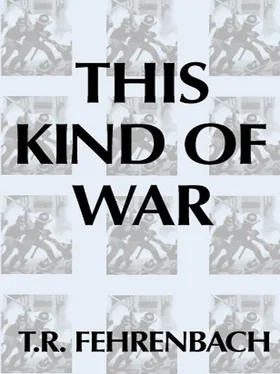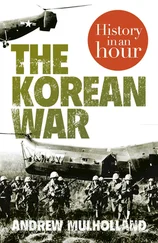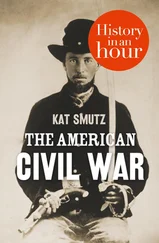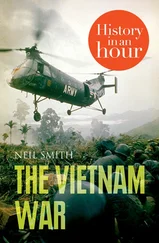Yet the American people, Army, and leaders generally proved unwilling to accept wars of policy in lieu of crusades against Communism. Innocence had been lost, but the loss was denied. The government that had ordered troops into Korea knew that the issue was never whether Syngman Rhee was right or wrong but that his loss would adversely affect the status of the United States—which was not arguable.
That government's inability to communicate, and its repudiation at the polls, firmly convinced many men of the political dangers of committing American ground troops in wars of containment. Yet without the continual employment of limited force around the globe, or even with it, there was to be no order. The world could not be policed with ships, planes, and bombs—policemen were also needed.
Less than a year after fighting ended in Korea, Vietnam was lost to the West, largely because of the complete repugnance of Americans toward committing a quarter of a million ground troops in another apparently indecisive skirmish with Communism. Even more important, the United States, as the Joint Chiefs of Staff reported, simply did not have the troops.
Korea, from Task Force Smith at Osan to the last days at Pork Chop, indicates that the policy of containment cannot be implemented without professional legions. Yet every democratic government is reluctant to face the fact. Reservists and citizen-soldiers stand ready, in every free nation, to stand to the colors and die in holocaust, the big war. Reservists and citizen-soldiers remain utterly reluctant to stand and die in anything less. None want to serve on the far frontiers, or to maintain lonely, dangerous vigils on the periphery of Asia. There has been every indication that mass call-ups for cold war moves may result in mass disaffection.
The United States will be forced to fight wars of policy during the balance of the century. This is inevitable, since the world is seething with disaffection and revolt, which, however justified and merited, plays into Communist hands, and swings the world balance ever their way. Military force alone cannot possibly solve the problem—but without the application of some military force certain areas, such as Southeast Asia, will inevitably be lost.
However repugnant the idea is to liberal societies, the man who will willingly defend the free world in the fringe areas is not the responsible citizen-soldier. The man who will go where his colors go, without asking, who will fight a phantom foe in jungle and mountain range, without counting, and who will suffer and die in the midst of incredible hardship, without complaint, is still what he has always been, from Imperial Rome to sceptered Britain to democratic America. He is the stuff of which legions are made.
His pride is in his colors and his regiment, his training hard and thorough and coldly realistic, to fit him for what he must face, and his obedience is to his orders. As a legionary, he held the gates of civilization for the classical world; as a bluecoated horseman he swept the Indians from the Plains; he has been called United States Marine. He does the jobs—the utterly necessary jobs—no militia is willing to do. His task is moral or immoral according to the orders that send him forth. It is inevitable, since men compete.
Since the dawn of time, men have competed with each other—with clubs, crossbows, or cannon, dollars, ballots, and trading stamps. Much of mankind, of course, abhors competition, and these remain the acted upon, not the actors.
Anyone who says there will be no competition in the future simply does not understand the nature of man.
The great dilemma of our time is that, with two great power blocs in the world, each utterly distrustful of the other, and one, at least, eager to compete, we cannot compete with thermonuclear weapons. Competition, after all, is controlled action or controlled violence for an end, and nuclear weapons do not lend themselves to control. And in nuclear war there is apparently no prize, even for first place.
Yet men must compete.
It is still possible that one or both segments of mankind will embark upon what will be the last crusade. It is much more likely that they will collide again on lesser scale, as they have before. But even on a lesser scale the game can be lost, or won.
We can lose the game not only because of the nature of our enemies, but because of our own. We understand we cannot ignore the competition, and realize with frustration that we cannot end it by putting our competitor out of business with a bang, but we will not willingly face the fact that we may walk along the chasm, beset by tigers, for many years to come.
There will be more threats in fringe areas, like Korea, because Communist doctrine demands them. Here ends and even morality will be vague. There will be no cheap, easy, or popular answers to these threats. We may have the choice of limited, controlled violence for temporary ends—or of blowing the whistle on the game—and with the game, possibly mankind.
The enemy is no superman, as was proved on Pork Chop Hill. Anything he can do, we can do better—if we have the will. At Pork Chop men said we played the enemy game, not our own—but from Saigon to Berlin the enemy game may be the only one in town.
Korea showed, or should have shown, that all is not easy in this world, that for the rest of this century things may not get better but will probably get worse, and to talk despairingly of going up in smoke or frying in hard radiation is no answer. If the free nations want a certain kind of world, they will have to fight for it, with courage, money, diplomacy—and legions.
Korea showed it was time to tell the men who man our legions that there is nothing easy is this world, that there are tigers, and to furnish them not only with atomic life eradicators but tiger guns. Korea showed that a free government must be prepared to do the unpopular thing, even if it destroys itself. Governments are not important; nations and peoples and what they stand for, are.
It was time for free, decent societies to continue to control their military forces, but to quit demanding from them impossible acquiescence in the liberal view toward life. A "modern" infantry may ride sky vehicles into combat, fire and sense its weapons through instrumentation, employ devices of frightening lethality in the future—but it must also be old-fashioned enough to be iron-hard, poised. for instant obedience, and prepared to die in the mud.
If liberal, decent societies cannot discipline themselves to do all these things, they may have nothing to offer the world. They may not last long enough.
Aristotle wrote, Almost all things have been found out, but some have been forgotten.
Americans have learned of Brad Smith, who first saw long, black T-34s rumble forward in the rain at Osan, of the late Company A, of Frank Muñoz and Company at the horror of Kunu-ri, of Mike Shinka on Obong-ni, John Yancey led back blind from the icy hills beside Chang-jin, and Joe Clemons' dozen men who were King indeed on Pork Chop Hill. These were the Korean War—the misery, the waste, the splendor, the courage, the trauma that lingers still. Millions of Americans can find no meaning in any of it.
It is while men talk blithely of the lessons of history that they ignore them.
The lesson of Korea is that it happened.
| Go to Table of Contents |
Chronology
25 June 1950
NKPA invades South Korea.
U.N. Security Councils calls for end of aggression.
27 June 1950
U.N. asks members to go to aid of ROK.
28 June 1950
Seoul falls; ROK Army destroyed.
30 June 1950
President Truman orders U.S. ground forces into Korea.
5 July 1950
First U.S. ground troops go into action at Osan.
7 July 1950
Читать дальше












